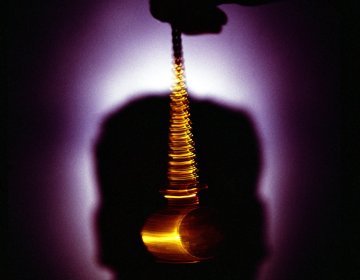ST. LOUIS (AP) -- The memories that came flooding back were so horrific that Lisa Nasseff says she tried to kill herself: she had been raped several times, had multiple personalities and took part in satanic rituals involving unthinkable acts. She says she only got better when she realized they weren't real.

Nasseff, 31, is suing a suburban St. Louis treatment center where she spent 15 months being treated for anorexia, claiming one of its psychologists implanted the false memories during hypnosis sessions in order to keep her there long-term and run up a bill that eventually reached $650,000. The claims seem unbelievable, but her lawyer, Kenneth Vuylsteke, says other patients have come forward to say they, too, were brainwashed and are considering suing.
``This is an incredible nightmare,'' Vuylsteke said.
Castlewood Treatment Center's director, Nancy Albus, and the psychologist, Mark Schwartz, deny the allegations, and Albus pledged to vigorously fight the lawsuit, which was filed Nov. 21 and seeks the repayment of medical expenses and punitive damages. As in other repressed memory cases, which typically involve allegations of child abuse, the outcome will likely hinge on the testimony of experts with starkly different views on how memory works.
Nasseff stayed at Castlewood from July 2007 through March 2008 and returned for seven months in 2009. She was struggling with anorexia.
In her lawsuit, Nasseff claims that Schwartz used hypnotic therapy on her while she was being treated with psychotropic drugs, and her lawyer says Schwartz gave her books about satanic worship to further reinforce the false memories. She says she was led to believe she was involved in a satanic cult whose rituals included eating babies, that she had been sexually abused and raped multiple times, and that she had exhibited 20 different personalities.
Vuylsteke said the trauma was too much to bear, and that Nasseff tried to get hold of drugs to kill herself while she was at the center.
``Can you imagine how you would feel if you thought you had participated in all these horrible things?'' Vuylsteke asked.
Eventually, Nasseff learned from other women treated at Castlewood that they, too, had been convinced through therapy that they were involved in satanic cults, Vuylsteke said.
Nasseff returned to her home in Minnesota, where she works part-time in public relations and has her eating disorder in check, her lawyer said.
In her lawsuit, she claims that Schwartz warned her in October 2010 to return to Missouri for additional treatment or she would die from her disorder. She says he left a phone message this October warning that if she sued, all of her memories of satanic rituals and abuse would be revealed.
Schwartz, reached by phone at the center, where he is its clinical co-director, denied any wrongdoing but declined to discuss the case further because he hadn't hired a lawyer yet. He previously told ABCNews.com that he never hypnotized Nasseff, that they had never discussed satanic cults and that she never told him she had committed criminal acts.
Albus didn't respond to requests for comment, but she told Courthouse News Service that Castlewood ``strongly believes that all of these claims are without merit and we intend to defend these claims vigorously.''
Repressed memory cases, which typically involve allegations of abuse that happened during someone's childhood, became more common in the 1990s. But some experts question their validity.
Elizabeth Loftus, a professor at the University of California, Irvine, said there is no scientific evidence to suggest that the brain can store away bad memories then have them suddenly emerge.
``Where is the proof you can be raped in satanic rituals and have absolutely no awareness of it, then reliably recover those memories later?'' she asked.
However, neither Loftus nor Jim Hopper, a clinical instructor of psychology at Harvard Medical School, would speculate about whether Schwartz may have implanted false memories. Both agreed people can have memories of events that didn't really happen and that the power of suggestion can play a role in producing false memories.
Loftus cited several medical malpractice cases won over memories that proved to be false.
Hopper said he believes memory is complex.
``Something that happened years ago can be encoded in the brain in various ways, and various combinations of those memory representations may be retrieved, or not, in various ways, for various reasons, at any particular time,'' he said.
<한글기사>
'정신치료사가 끔찍한 허위기억 심어'
미국의 한 여성이 심리치료사가 최면치료를 하면서 강간, 다중인격, 악마의식 등 끔찍한 허위 기억을 자신에게 심었다고 주장하며 소송을 제기했다.
세인트루이스 교외 병원에서 15달 동안 거식증 치료를 받은 Lisa Nasseff 라는 31세의 여성은 심리치료사 Mark Schwartz가 입원를 연장할 목적으로 허위 기억을 이식했으며 병원비가 65만 달러나 나왔다고 주장했다.
Nasseff는 자신이 여러 차례 강간당하고 다중인격자이며 상상할 수도 없는 행위를 하는 악마 의식에 참가한 기억을 갖게 되었으며 너무 두려운 나머지 자살까지 시도했다고 주장했다.
그녀는 모든 것이 허위라는 것을 알고 나서 상태가 나아졌다고 말했다. Nasseff는 지난 11월 21일 병원비 환불과 처벌적 손해 배상을 청구하며 소송을 제기했다.
Nasseff는 2007년 7월에서 2008년 3월까지 Castlewood Treatment Center에 입원했으며 2009년에 다시 7달 동안 입원했다.
변호사인 Kenneth Vuylsteke는 다른 환자들도 세뇌를 당했으며 소송을 고려하고 있다고 주장했다.
Schwartz와 병원 관계자들은 혐의를 부인하며 법정에서 다툴 것이라고 밝혔다. 전형적으로 아동학대 주장이 나타나는 여타 억압기억 증상에서와 마찬가지로 이번 사건도 기억의 작용에 대한 상이한 견해를 가진 전문가들의 증언에 좌우될 것으로 보인다.



![[Exclusive] Korean military set to ban iPhones over 'security' concerns](http://res.heraldm.com/phpwas/restmb_idxmake.php?idx=644&simg=/content/image/2024/04/23/20240423050599_0.jpg&u=20240423183955)




![[Pressure points] Leggings in public: Fashion statement or social faux pas?](http://res.heraldm.com/phpwas/restmb_idxmake.php?idx=644&simg=/content/image/2024/04/23/20240423050669_0.jpg&u=)
![[Herald Interview] 'Amid aging population, Korea to invite more young professionals from overseas'](http://res.heraldm.com/phpwas/restmb_idxmake.php?idx=644&simg=/content/image/2024/04/24/20240424050844_0.jpg&u=20240424200058)









